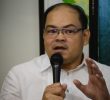Econ advisers present measures to counter crisis, Davao to benefit
DAVAO CITY — High-ranking government economic managers recently presented various measures that will be taken to sustain economic growth in the midst of the global financial crisis.
Finance secretary Gary Teves explained that the program dubbed ERP or the economic resiliency plan pertains to an adjustment in government finacial policy. Instead of focusing on the country’s interest payments, bulk of the budget will rather be poured to infrastructure investments and social service sectors to be able to ensure that the economy remains buoyant. This means more construction, repair, rehabilitation of irrigation, and more construction of local roads.
National Economic and Development Authority (NEDA) secretary Ralph Recto said the ERP is also designed through better revenue collection, enhancement of cash liquidity, access to credit and low interest rates, and more effective spending. He local advised agencies to closely monitor the implementation of projects in the grassroots level to ensure effective spending.
Also present in the economic briefing was secretary of the Department of Budget and Management (DBM) Rolando Andaya, who reported that the DBM had already frontloaded 60 percent of its infrastructure development budget for the first half of the year, bringing the frontloaded infrastructure program to 100 billion pesos, more than 200 percent higher than the 33 billion pesos in 2008.
Andaya added that part of DBM priorities are the Surigao-Davao coastal road rehabilitation, the Kapalong-Talaingod-Valencia road junction circumferential road in the provinces of Davao del Norte and Bukidnon , the reconstruction of Baganga Bridge and approaches along Davao Oriental-Surigao del Sur Coastal road.
Recto says these infrastructure projects and other employment programs are expected to generate more than 800,000 new jobs and to support the target of a 3.7 to 4.4 percent Gross Domestic Product (GDP) growth rate.
In Davao Region GDP growth target was pegged at 4.9 to 5.9 percent among those industries that Recto pointed out would support the region’s growth in complementation with the government’s infra projects include the business processing-information communication technology (BPO-ICT) sector, trade, construction and agribusiness.(PIA XI)










